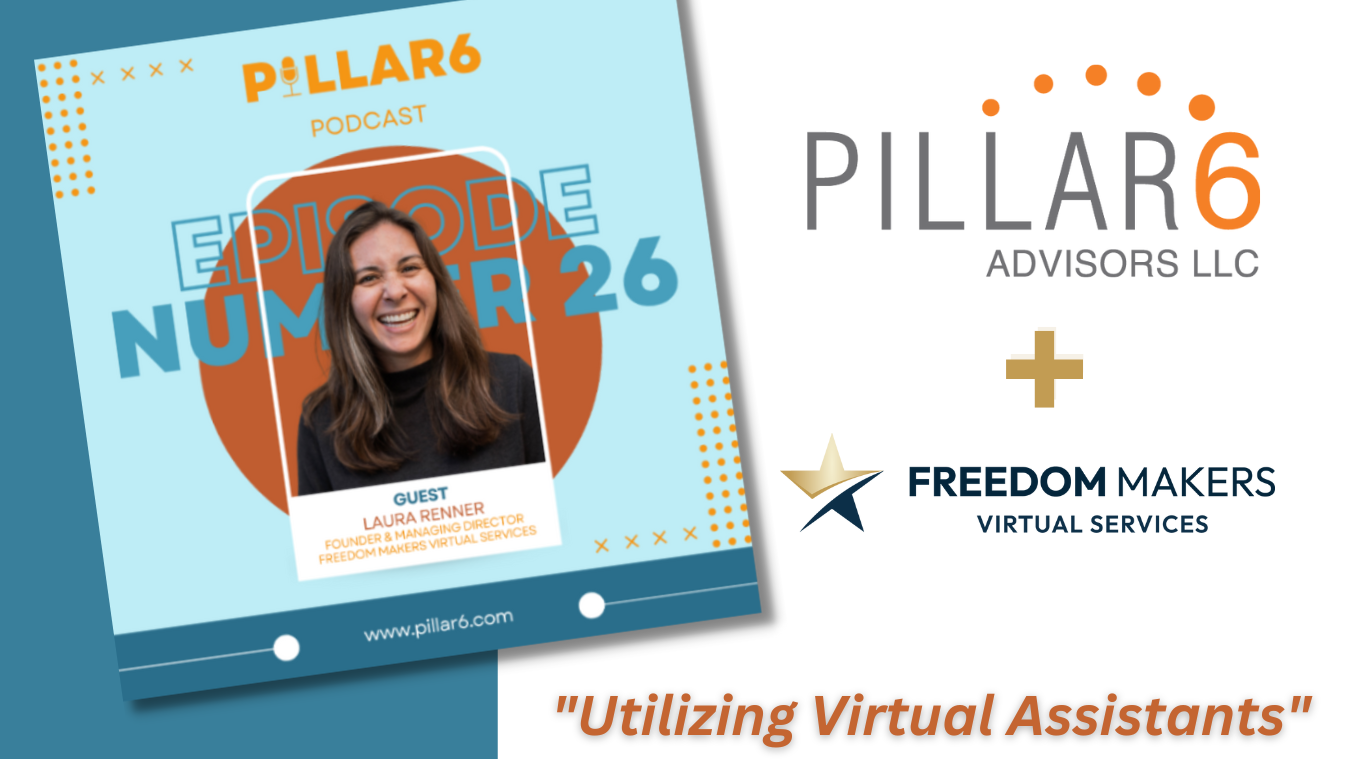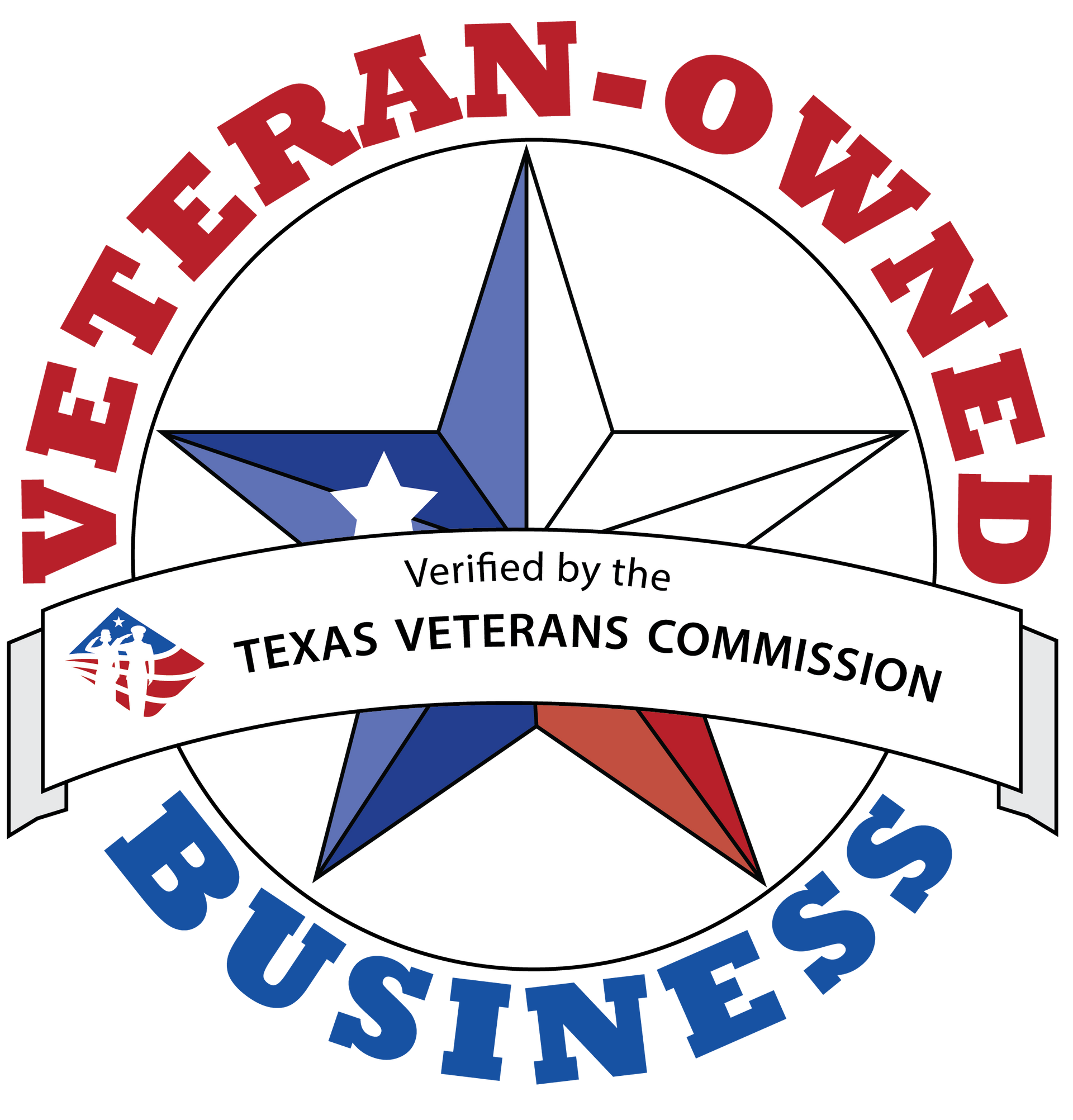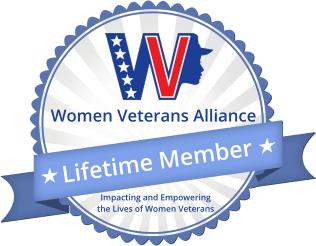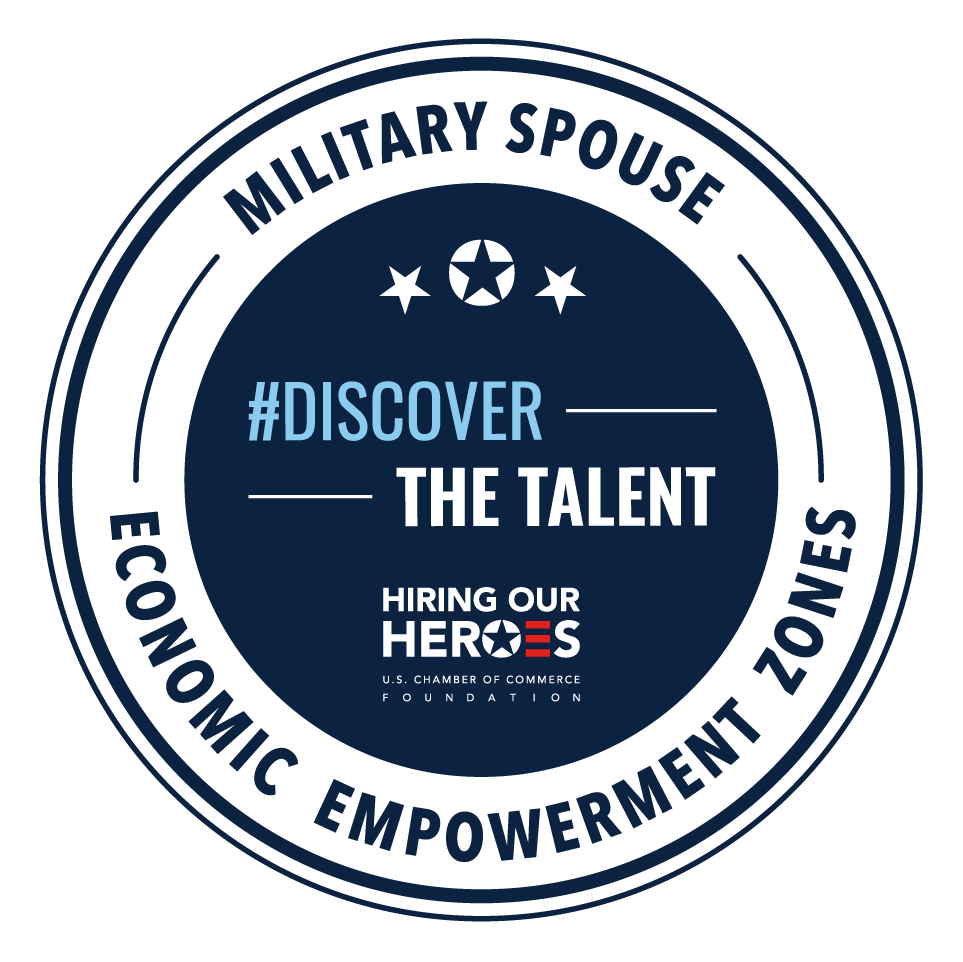Utilizing Virtual Assistants with Laura Renner

Pillar6 is a San Francisco-based wealth advisory firm focusing on clients who appreciate having clarity and control over their finances. The company was founded in 2010 as a solo-advisory practice and continues to grow with a dedicated team of professionals working together for the benefit of their loyal clients.
The experts at Pillar6 help their clients make smart financial decisions so that they can protect and preserve their wealth wisely.
In a recent episode of the Pillar6 Podcast, Pillar6 Founder and Managing Principle,
Roman Polnar, interviewed Laura about how hiring military spouses as virtual assistants can help entrepreneurs and small business owners grow their businesses.
Together they discussed how finding the ideal virtual assistant can be challenging. Laura shares why military spouses are ideal candidates for virtual assistant roles, what criteria to consider when hiring a virtual assistant, and why solopreneurs and businesses with small teams can benefit from the help of a virtual assistant.
In The Podcast:
- Laura explains what makes Freedom Makers Virtual Services unique
- Why military spouses are the ideal virtual assistants
- Laura's journey to becoming a business owner & how she built Freedom Makers to accommodate her passion for travel and adventure
- How and when to "get out of your own way" as a leader
- Why communication is the key in business and in life
The transcript of Roman and Laura’s awesome conversation is below. Or, take a listen here:
Welcome to the Pillar Six podcast where we talk about important topics around money, life, success, and the balance of it all. While money can't buy happiness, it can buy time and freedom to do what you want with the people you care about most. Now let's get started with the show.
Hello everyone, Roman Polnar here, I'm your host. And on this show, we talk with thought leaders, business leaders, authors, speakers, and professionals about success at that often elusive intersection of life and money and I asked them to share their top tips that helped them lead a well-rounded, fulfilling and successful life.
And in today's episode, we'll be talking with Laura Renner.
Laura is the founder of Freedom Makers which is a virtual assistant agency that helps business owners get things done by pairing them with qualified, versatile and experienced military spouses for remote administrative support.
She is also an Air Force reservist and a travel junkie. I think we'll talk more about that. I want to know more about it!
And just before I welcome Laura, a quick word from our sponsor.
[SPONSORSHIP] This episode is brought to you by
Pillar6 Advisors. Pillar6 is a financial planning and wealth management firm for successful individuals and families with active lifestyles. Pillar Six clients appreciate having clarity and control over their finances and the peace of mind in knowing that their finances are well aligned with their core values, goals and priorities. To learn more, go to pillarsix.com or email
hello@pillar6.com.
ROMAN POLNAR
And so without further ado, Laura, welcome to the Pillar6 podcast.
LAURA RENNER
Thank you. I'm happy to be here.
ROMAN
We're glad to have you here. So I've got a lot of questions and I know you travel a lot and you run a business that helps. I think other business owners get some time back so perhaps they could do some traveling too.
But before we get into all that, I don't know if I introduced Freedom Makers in the best way that you would want me to introduce it. So tell us! Give us that high-level flyover view of what is Freedom Makers.
LAURA
Sure.
Oh, I like that flyover view. I might copy that from you. It is a virtual assistance agency and we primarily support solopreneurs and small businesses with virtual admin support. And we do that by pairing them with
military spouses.
I came up with this idea back in 2015 because at the time I was doing recruiting for small businesses and I was just meeting a lot of business owners who weren't ready to hire. Either they didn't have enough consistent work or they were concerned about the consistent revenue to be able to pay someone else or the compliance side of it. So they still needed help, but they didn't have enough help or didn't need enough help even just for consistent part-time support.
Meanwhile, my brother is still active duty. And at that time he was getting ready to move and I was talking to my sister-in-law about what she was going to do for work at their next location. I'm like I keep having this conversation with her over and over. And when I was in, I watched my colleagues' spouses go through that. My dad was military. We watched my mom go through that.
And I was like, we have this untapped source of talent over here and this unmet need on the business owner side can put two and two together that supports what both need in a way that also solves an issue or solves a problem.
ROMAN
See, I was going to ask you like, how did you come up with the idea? And so you answered that question before I had a chance to ask it.
LAURA
(laughs) But then the question is, did I answer your first question?
ROMAN
Well, you did. I think most of our listeners probably know what kind of a virtual services agency is. I just thought it was really unique that you focus exclusively on working with military spouses. I don't know. Does anyone else do that?
LAURA
There are a couple, yes. We all specialize in different ways. For us, a big differentiator is the freedom side of it. It's a big part of our name and with that we don't have a minimum hour requirement for clients. Again, speaking to that sort of inconsistent need on the solopreneur and the small business side, we focus a lot on what provides the most flexibility to both the spouses and the clients and the business owners.
So like on the spouse's side, we never assign work. We let them express interest in the work that they are able to do and available for and then we match them that way. Whereas other agencies might say, oh, you can have a VA within 24 hours, and it's because they're just arbitrarily assigning based on availability maybe or something like that.
So that's a big difference for us. And part of it too is people say, oh, but you could expand to first responders or moms who left the corporate world and absolutely we could. However, we haven't even tapped the surface of the talent within the military spouse community. So when we grow so big, then maybe we can expand outside of military spouses.
We have some veterans and retirees as well, but it's predominantly military spouses in our community.
ROMAN
So I'm interested to hear in your eight years of running Freedom Makers, and I'm sure you've spoken to a lot of business owners who have given you feedback about their experience in working with a Freedom Maker, kind of combined with your prior experience of doing recruiting, what would you say are some of the most consistent feedback that you get about why businesses continue to use your service in working with military spouses? Like, what makes that unique?
LAURA
I think a big piece is sort of the versatility.
What I've come to realize over time is military spouses, regardless of their education, experience education or work experience. Every single one of them knows how to research because they move so much. They have to research their next location without even having a chance oftentimes to go there and visit, right? So they're looking up schools, they're looking up homes, they're looking up work opportunities. And they're able to do all of that. And that's oftentimes what a small business owner needs. Like, hey, can you help me find XYZ a list of client businesses in this area? Right? So that's part of it. And I think another part is there's certainly the trust factor that comes with working with... your foundation of trust starts higher than outside of the spouse community. But what military spouses are also… what we have found is they tend to be renaissance people. They can do a little bit of everything. And that's also what solopreneurs and small business owners like and so once they come in and they find one that is a fit for them and they're like, oh wow, you're taking care of this now you're going to take care of that, take care of that?
They just really start to... it gets their business organized. I saw someone post: you think you're organized? Work with a military spouse and they'll tell you so! That's certainly, I think, a big part of it. And then I think just I hold the company's commitment to serving our clients serving spouses, and constantly trying to improve how we do that, I think also resonates with our clients.
ROMAN
I think it's possible that one of or if not the person who said that quote is probably someone that we both know and I think I should definitely give her a shout out right here and right now, because if it wasn't for Patricia Defonte, we might not have been having this conversation. So Patricia, this is a plug for you. I know have worked with Patricia for a while, but for our listeners who don't know Patricia, she is an estate planning attorney here in San Francisco Bay Area. She runs Defonte Law and I think she is just an evangelist for Freedom Makers
And she talked so much to me about how working with Freedom Makers totally transformed her business. And she's like, "I didn't know what organized was until I had a Freedom Maker, and then I realized how disorganized I was!" And so anyways, long story short, Patricia, thank you for the introduction, for making this episode possible.
But she also finally, I don't want to say directly, but indirectly, convinced me to become one of your customers. So for full disclosure for our listeners, we're also customers of Freedom Makers, and I have firsthand experience and absolutely love the work that you do. So thank you.
LAURA
Thank you so much.
I appreciate that. I don't know if it's a shameless... It's a proud plug for Patricia. Working with her and what she does... I haven't met anyone who does the work she does - estate plans and things like that - to the level that she does. And so I will proudly also plug Patricia and the work she does.
ROMAN
Yeah, it's interesting. So you talked a little bit about how small business owners have all these different needs and I think it also in a way goes to our kind of personality types and the way that our minds work. It's like we're constantly coming up with this, oh, we can do that better. And we can do this better, and we should really change it the way we do this for our clients. And it's like better, better, better, but somebody has to do the work. And I think oftentimes we get stuck because we're like our worst enemies in a way. We generate ideas, but then who gets to implement them? And I think that from my personal experience.
And I'll give another shameless plug for our Freedom Maker, for Tova, who has been an awesome addition to our team. And she's just able to listen, take in all these ideas and some of them are off the charts. And she just has this really incredible way to organize this otherwise disorganized stream of thoughts and say, all right, we're going to do it in this way. And there's something that is unique, I think, to the way that they're able...
m aybe it's the structure or the discipline that maybe exists within their own families because they're military families that really does come across.
LAURA
I think so. And not to put words into people's mouths, but from what I've experienced watching spouses, oftentimes they're the ones who have to run the house because the service member is gone all the time or just the demands of the service member.
So they're the ones who have to run the house. But then you're dealing with it in a lot of ambiguity. Like you don't know when they're coming home, you don't know where you're going next. You have to have it all organized in order just to manage what you can manage. So I think you're right that the nature of their lives lead them to be very organized and organized within chaos, which is what every small business basically is!
ROMAN
Yeah! It's an organized ball of chaos that does good work. But yeah, it's a lot of moving pieces. There's never time off.
LAURA
Right! And that's what when we onboard New Freedom Makers, we talk about that like a small business. Their sales, their operations, their customer service, their accounting, it marketing. They're doing everything in addition to the work of how they're supporting their clients. So when they hire you, when we're speaking to the freedom here, it's like they might take off a hat completely and hand it to you and be like, you got this. Or they might be like, you're going to help me with a little bit with each of these hats? And so we do talk to them about how do the challenges small business owners face. And we ask them, too, what has been your experience as part of our screening with small businesses? So they understand the unique challenges that you don't get if you're working in the accounts receivable department of a large corporation, you don't get that exposure to the challenges that you face when you're wearing every single hat.
ROMAN
Well, I know also when choosing an assistant, and not just the personal assistant but let's just call it, say virtual assistant, right. I think it's difficult to also find, if not impossible to find, kind of a master of all right, because you end up kind of dabbling, but not really being good at any one thing. Does Freedom Makers have these different silos where businesses can choose a candidate that has an expertise in one of those areas. Like marketing or writing, sales or operations, et cetera.
LAURA
Yes and no. Part of our screening, for lack of a better phrase, process for clients is what we look for is, are they systems oriented? They might not have the systems in place, but if they can at least think through I'd like A, B and C to happen, and if my Freedom Maker could document that or build that, that'd be great, right? So we kind of look for that also, I always say we're equipped to execute. So sometimes people will come to us say, as an example for social media.
I need a social media strategy. And it's like, okay, well, you need a consultant for that, but once they build it, we can execute it. So sometimes we're always looking for do they think they're going to find a unicorn? In which case that's unrealistic and we need to clarify that with them. Or do they need someone who can dabble a little bit of everything or some things, and then we can also look for that, right.
But when they do need something specific, like, I'm looking for someone who can help me
write my blogs or someone who can do some bookkeeping, that kind of thing, we do definitely screen for that. And that goes back to that freedom side, because sometimes we'll get people who have bookkeeping experience as an example, and they are burnt out and they don't want to do it anymore. So we're not going to go to them and say, oh, well, you got to support this bookkeeping. I don't want to say categories, but we tag them, for lack of a better phrase, within their profile so that when we go and search for people with specific copywriting experience or bookkeeping experience, we can find them and then ask them if they're interested if the client's looking for something that specialized.
ROMAN
Laura, how many Freedom Makers do you currently have in your ecosystem?
LAURA
We have about 100 I'm sorry, 300 in our network and about 100 actively working at any given time.
ROMAN
And I know you touched on pieces of this earlier when you were describing Freedom Makers and what makes it unique, but what would you say to someone who is either using a VA currently or maybe is thinking about hiring a VA, probably traditional and more common offshoring VA kind of universe?
LAURA
Sure. Yeah, so I generally say there are four types of VAs. Offshore being one, agency style - which is what we call us - being another. Then there's like the tech platforms like Upwork or Fiverr and then the freelancer, another solopreneur. And so when it comes to offshore versus us as an agency, they're almost like two extremes. With offshore it's certainly a lot cheaper. And so then you have, you can hire them full time, you know, and, and you take that time to train them or get them up to speed because the, the price point is favorable in that regard.
But then you're dealing with, or at least for us on our side, everyone is familiar or knows US culture, US Work style, communication, nuances, things like that. So I don't want to say they are US based because they might be stationed overseas or a foreign spouse, but they are aware of or they're American by that standard or whatnot, but they all know American language, American management styles, that kind of thing. And then usually they're going to be within the CONUS time zones as well. So you're able to have sort of more nuanced relationship or I call it a thought partner. They become a thought partner, whereas offshore is going to be more like task management type relationship, which that might be what you're looking for, right? And that's totally fine. And so it's more about understanding what you're looking for and finding a fit that way.
So I always say the pros of offshore is that it is cheaper and it's very task management and if that's all you want, that's great. For us, it's more service oriented. One, we have people who know American business management style, right? But two, they become more like a thought partner and then you have us in the background supporting the relationship. And then like Fiverr and Upwork, it's more about if you are comfortable handling hundreds of applicants, right. For us, our screening process, we choos four, up to four for the client and the client chooses other agencies. They just assign a VA. But Upwork and Fiverr, you have to do all that yourself. But if you want that, then that's the place to do that, right? And then the solopreneur is great. If it's more of finding them through your network. The risk there though is they are usually a one person shop and so you definitely create that thought partnership relationship with them, but maybe not with a backup or a safety net that an agency provides.
So those are a quick rundown of all the pros and cons of the four types of VAs in general.
ROMAN
That actually really resonated with me because I think I've tried virtually all of those over the last 20 years. I've had a dedicated assistant that worked with me for several years, and then she moved away. And this was before Zoom, and this was before remote work was a thing, and we couldn't work together when she had to move to a different city and it was too far.
And then I remember thinking, like, well I'll get a VA, but we're in a very not just compliance side heavy, but in a very confidential type of business. Confidentiality is very important. Security is very important so I didn't feel comfortable with a VA that was somewhere else. So that was almost off the table and then finding somebody is hard and then you try these agencies, like you said, and you get 100 applications.
It's like posting a job on a job board and it's like, oh, my God, I got to find an assistant to help me go through all the applications to find the person to hire as an assistant. So I think that the fact that you guys do the screening, I can personally just say from experience is really, really meaningful and is a huge time saver. And the fact that I think they're part of the military spouse, not spouse, military family in a military environment, I think there's a level of confidentiality there that's built in because, you know, sort of where they are.
LAURA
Sure!
ROMAN
All right, let's pivot. Let's shift gears a little bit. I want to talk to you about how did you start a business as a business owner? What was that like?
LAURA
Yeah, so this is actually my third business, and my first one never got off the ground, and my second one was doing the recruiting for small businesses. And the funny thing is, they say starting a business is hard, and that second business was so hard, and I just kept saying, oh, it's because starting a business is hard. I realized in hindsight it was hard because I didn't like it. It wasn't a fit for me. And so once I pivoted to Freedom Makers, then it became hard, but in a fun way or a good way, it was a challenge because there's so much to do and you're trying to do it. I remember using the analogy of every morning you're rolling a rock or you're rolling a wheel, but you have to start from it being still. And so all that energy that you have to find in yourself to start the wheel rolling again every morning, and eventually it starts rolling itself, and you just have to make sure it keeps rolling, right? But until that point, it's a challenge. But it's a good challenge because you can see, oh, I just ironed out that rocky part. It's going to roll more smoothly next time, that kind of thing, right?
Versus I think I was trying to roll a box during the second one. It wasn't a fit for me, right? And so I think that was part of it is recognizing when they say starting a business is hard, it's a good hard, it's like a workout hard where you feel the benefits of it either during or shortly after, right? And then I think my first big learning moment, if you will, was the irony of me starting an admin support company is… I really suck at admin.
ROMAN
I was going to ask you about that.
LAURA
So I started the business in April 2015. Our first client was in June. So by default in 2016, we grew necause we had full twelve months, right? And then in 2017 we grew by, to us a measly 11%. And I realized that I was the one holding us back. Because the amount of scheduling that goes into scheduling, we call them selection calls, is tremendous. And it's not easy. You're scheduling between multiple people. And we have yet found a software that lets us do it without us being required to be there, right? The calendar based on the host kind of thing. And I sucked at it, to be honest. It'd be like the day before, I'm like, oh snap, hey, are you available tomorrow?
One of my first hires was having someone else, a military spouse, to do the scheduling. And then we grew, I think the next year we grew by 60% or something. Like it was crazy getting out of my own way, letting go of what I was holding the company back on was a big learning moment for me as, as an owner and a leader around, you know, recognizing my weaknesses and instead of trying to strengthen them, hire out for them.
ROMAN
So what's, what's your thinking around this? Do you have one dedicated personal assistant that then knows and manages multiple aspects that you're not strong at? Or do you have more kind of incremental part time assistants, but there's multiple, each handling a specific task that they're excellent at?
LAURA
That is a great question, and it really goes off of what you prefer. We now are a team of eleven that run the company but when I first hired, I think, I hired two people at the same time. One to do all the scheduling and the other one to do client management. Or we call it client success. Generally speaking, though, part of it is skill set and experience, but part of it is also what I call actually, I stole it from a guy named Michael Hyatt: Levels of delegation. And so for the scheduling, I wanted it done exactly a certain way and so I wanted someone who would honor that and stay within that level of delegation for client success. I was like, you know what, I don't know much about that, so I need someone who knows how to do it and you kind of run it, but we'll work on it together, right?
So I needed someone who was willing and able to take more leeway, whereas the coordinator, the scheduling coordinator I wanted it done a specific way, right? So for me, that made me choose two different people because I wanted the different levels of delegation, right? When I give talks, I always say like… Google “Michael Hyatt and the five levels of delegation.” But I stole that from him. I'm sorry. I was inspired by…
ROMAN
Well, if you're crediting him, you're sort of then just you're borrowing. Spreading his word!
LAURA
That's one of the things I say. Sometimes you can find someone who can do both. I always recommend really choose by level of delegation because then it's a little bit easier. Here's maybe a clearer example. We've had attorneys sometimes within the spouse community we'll have paralegals. So sometimes we've had attorneys where they will hire the same person, but some of their tasks will be admin tasks, and some of their tasks will be paralegal tasks. And those are different rates, right?
And so it conceivably could be two different people or it could be the same person. And in our time tracking system, they're called assignments. So we'll just create two different assignments. So the Freedom Maker will log time in or log time as the paralegal. So you can do it with one person or you could do it with multiple people.
It just depends on, one, your willingness to manage, the more people, harder to manage, and two, your comfort level with levels or what levels of delegation you're doing for each type of task.
ROMAN
That's awesome. So let's talk a little bit about your traveling because I know that you're a big traveler. I think you actually added adventure travel junkie. So there's more than just travel junkie. You’re an adventure travel junkie. Let's talk about that.
LAURA
Yeah, I just like to do different things. I can't say I'm extreme. I've never climbed Mount Empress or anything like that. But yeah, back last year I did the Machu Picchu hike. So I do like to do things like that and I'm an avid snowboarder. I'm not doing like the crazy jumps or anything, but I do snowboard every season, that kind of thing. So I like to try new things and I do like to be active and I don't… like my comfort zone is being on the move. I've noticed when I'm home too long my productivity dips a lot.
ROMAN
So how has has like running a business or building a business and then running a business, has that slowed down your travel or not?
LAURA
That's the beauty of starting a business is you can design it around your life. And remember when I started Freedom Makers, the whole thing is that it had to be completely virtual. And even I would get clients who would say, I get that you're virtual. That's great. Do you have anyone local who could come in one day a week? And maybe we did, maybe we didn't. But I would always respond with maybe. But then once they move, then you're not going to have them and they're going to lose out on work, they're going to lose a work opportunity. So we were committed to being completely virtual from the start. We also within the company, within the internal team. Part of our culture is that we work asynchronously we do, have meetings and things like that. But the whole idea is that if you build it so that you can run it through a project management tool or communication tools like Slack or whatnot that you can grow it that way or honor it that way.
From the start, I remember I was talking to someone who they were like, oh, when I'm ready to travel, I'll make my company virtual. They were meeting their clients in person. And that's hard to shift. COVID kind of helped force everyone to shift their mindset, but prior to that, that was a huge mindset to have to shift. And so for me, I just committed to it from the beginning that we were going to allow people to work from anywhere. And I always say I'm on permanent workcation.
ROMAN
Yeah, I mean, it gives a different dimension to lifestyle business because I think a lot of business owners who think about a lifestyle business, they think it's either something that doesn't make any money or it's something that they will be able to do later... once that ball gets the wheel, as you called, it gets rounded off and it starts to kind of roll on its own, then it becomes a lifestyle business. But I think you're right that COVID really did shift everyone's perspectives around virtual work in general, or just remote work, not even virtual remote work. I imagine you're seeing the same thing in your business. You probably have more people now being open to virtual and remote work than before.
LAURA
Definitely. And even to your point, knowing what virtual is, I remember when I would go to networking events, I started the company in Oakland. I go to networking events in this… I don't want to say the suburbs, but the far reaches of the same area. And I would say I have a virtual assistance agency and people would be like, what's a virtual assistant? And now I don't have to explain that everyone knows what that is. That did shift the whole culture around remote work. But I'll say, too, that going back to your point about when I get the viewpoint was when I get to this point, then I can have the life I want to have. But what I've noticed is that that constantly shifts, even with me, right?
Like as we grow, I'm like, oh, well, then we'll be able to do this. I find myself thinking, when I get here, I can do this. But really it's a moving goalpost. The wheel never gets completely rounded out, right? You keep adding new things to it that makes it a rocky wheel. I think by definition, when you start a business, it's because you want to do things a certain way and so then you're just constantly moving that goalpost, right? Because you're an overachiever. That's why you started a business!
ROMAN
Guilty, charged.
LAURA
Right? Yeah. So to me, yes, our society is more open to it and is understanding it more now. But I think it's still a mindset thing that you have to as a business owner, you have to be willing to shift. Like I can design the business around the kind of lifestyle I want to have and I need to do it now because I'm never going to get there because when I think I'm there, I move the goalpost, right? Our society now has made it a little bit easier when it comes to virtual work or remote work.
ROMAN
Well, and I will just add that again, being in one of the professions where confidentiality is very important, security is very important. These things have often been the obstacles in the way of working with a traditional virtual assistant because we really didn't have a lot of control and visibility.
And so especially if it's a solopreneur if they're offshore somewhere, there's just too many what ifs and the risk is not worth the savings. And so that often would hold a lot of people back in other business areas as well.
And so I think that one of the things, and I do want to underline this as personal experience. Even though Freedom Makers is virtual, there's an element or several elements and layers of that security and confidentiality and controls that are in place that give us not only more confidence but it's not just this kind of blind faith confidence, but it's actual visibility and confidence that information is safe, processes are followed, systems are followed. So I just want to highlight that because I really do appreciate it, having gone through that full circle of working with different types of assistants in the past.
So as we're coming towards the tail end of our conversation, I just want to see if there's anything else that you wanted to offer kind of a highlight takeaway to our listeners who are business owners, are considering using a virtual assistant or maybe somebody that is just going to benefit from your words of wisdom. Having had your experience, what would you leave our listeners with?
LAURA
I think I guess my parting wisdom in life in general and in business is the more you can clearly communicate but also recognizing how you communicate. I realize I'm a better verbal communicator than I am written. Because I know that about myself. I will record videos for my team rather than type it all out.
That's my parting Thing is communication is the key to everything.
ROMAN
Communication, I love that. Well, not just in business. I mean at home exactly in our communities and friends and spouses absolutely. Through and through. That's a great reminder. I appreciate that.
LAURA
Yeah.
ROMAN
I'm going to ask you another personal question and I always ask this At the end of every one of our conversations. Is there a favorite book that you would share with our listeners or maybe something that you're reading now that you're really enjoying?
LAURA
Yeah, so I would say probably a favorite book or a favorite business book if you will, is Extreme Ownership, and it's a book written by someone from the military about business, but it's just about if you take ownership of what you're responsible for, and everyone on your team does just how powerful that can be. So my favorite sort of business leadership book, but also I tend to rotate. The books I read, like, between business self Hhelp, I do have a foreign policy background and then just fiction. So I am reading a book on the modern history of Korea right now. But my little trick that I've been hoing for about a month now that I learned from someone else is she set a rule as part of her morning routine that she would read three pages a day, regardless of what book it is, just to make sure that she's making a little bit of progress each day.
So I adopted that about a month ago, but I do about ten pages a night. It's just nice because you're able to get progress. A history book can be kind of dry, right? So I've been making progress on that book, so that's what I'm reading on a personal level.
But also my highly recommend book is Extreme Ownership.
ROMAN
What's your favorite fiction book or maybe a writer that you like?
LAURA
Okay, my favorite writer is a man called Andre Dubus. D-U-B-U-S. He passed away, but I think I probably have a lot of his books. I just love his style. I majored in English and undergrad, so it’s like I have all kinds of authors, but he's probably my favorite.
And then sort of my, I guess guilty pleasure book is a young adult series. The first title is called Daughter of Smoke and Bone. It's a fantasy book, but it's a nice, idealistic read, I think, a fantasy book. So those are always fun.
ROMAN
I love it. Well, we're going to put links to the books that you'd mentioned in the show notes so that if or when our listeners want to pick up a book that resonates with them as well, I think it's great that we're sharing and kind of helping share what we're really into.
LAURA
Sure. Yeah. Well, in that case, the book is called Korea's Place In The Sun, and it's a modern history of Korea, so it's actually about 20 years old, but it was modern back then.
ROMAN
Depending on the length of time you're looking at 20 years ago, it's just a blink of an eye away.
LAURA
Fair. Yeah.
ROMAN
I spent some time with a geologist, and when we talk about recent events. In geological events, he's talking about thousands of years. And so he's like something that happened 100,000 years ago is just so recent it's not even worth talking about. We can't use that as measurement just yesterday.
LAURA
Right, that's true.It's all relative.
ROMAN
Yeah.
LAURA
Part of my role in the Air Force was focusing on foreign policy and I focused on East Asia. And that's a famous quote you heard from I think it was Mao Tse Tung. But when they talked about sort of the communist rule in China or whatnot. And he was like, oh, I mean it hasn't been that long because China has a 5000 year history, right? So the past 200 years seems very short to them.
I'm not sure it's the right direction for the next 5000 years. I think within those 5000 years, there's probably another 200 year blip in there somewhere, right?
ROMAN
That's right. Well, it's been really good talking to you. And I know we've covered a lot of ground. Laura, where can people find you?
LAURA
Yeah, our website is freedom-makers.com, and there's a lot of stuff on there. We even have a task audit for people to take where you can determine what you're willing to let go of. But that's probably the best place to find out about us.
ROMAN
Awesome.
All right, well, we've been talking to Laura Renner, founder of Freedom Maker Virtual Services. And, Laura, thanks again for being with us, for sharing with us some time, your insights. Great having this conversation, and thanks to all of our listeners. Be well, everybody.
Thanks for listening to the Pillar Six podcast. We'll see you again next time and be sure to click subscribe.















